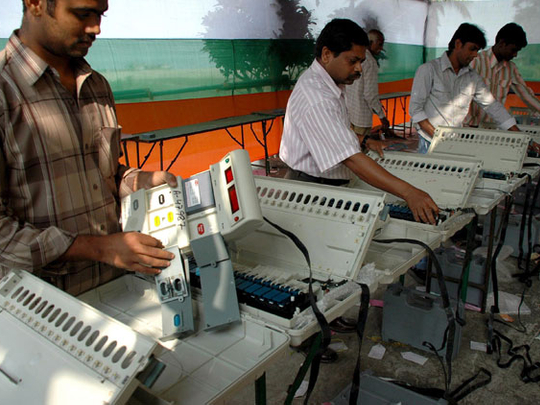
New Delhi: India’s Supreme Court recognised on Friday the right of voters to reject all candidates contesting polls, seen as a key reform ahead of general elections due next year.
A bench headed by Chief Justice of India P. Sathasivam asked the election commission to change electronic voting machine ballots to give voters a choice of “none of the above.”
“Democracy is all about choices and voters will be empowered by this right of negative voting,” he said, ruling on a petition by the non-profit People’s Union for Civil Liberties.
“Negative voting will send a clear signal to political parties and candidates as to what the voters think about them.”
Until now, voters had no right to reject candidates despite demands from activists to create such a provision.
The court noted that at least 13 other nations follow the practice of “electronic abstention.”
If the verdict is implemented, India will become the 14th country to adopt this practice.
The right to reject the choices will “foster purity in electoral politics,” Sathasivam said.
Voting machines are likely to be changed to conform with the court ruling in time for five state elections in November.
General elections are due by May 2014.
Activists have also been pushing for authorities to hold new elections if over 50 percent of voters reject all candidates.
Veteran anti-graft activist Anna Hazare has been a vocal campaigner for recognising the right to reject candidates as well as the right to recall an elected representative on the grounds of unsatisfactory performance.
Aam Aadmi Party’s Arvind Kejriwal said: “We welcome the Supreme Court judgment. It’s a very important step to clean the system in our country today.”
Gujarat Chief Minister and Bharatiya Janata Party’s (BJP) prime ministerial candidate Narendra Modi, in his blog, said: “I wholeheartedly welcome this. I am sure it will have a long-lasting impact on our polity and will be a great step in the direction of further electoral reforms that can make our democracy even more vibrant and participative.”
However, the national Congress government argues elections are meant to elect and not reject candidates, saying offering such choices will only confuse voters.
Ajay Maken, head of the Congress’ media cell, said: “In principle, we have no problem with it but there are certain issues for which we want to read the entire order. This order doesn’t say anything new because earlier also people who did not want to vote for lack of choice did not go to the polling stations. Now, they can go to the polling station and register their protest.”
It was a mixed response from Kerala with CPI-M general secretary Prakash Karat saying that these things should be discussed in parliament and it was unfortunate that the apex court decided this.
“Electoral reforms and issues of tackling money and muscle power in politics are all issues that parliament should decide,” said Karat.
Chief Minister Oommen Chandy when asked for a comment shot back to the media that it was sad that the media was not interested to know or ask what affects the common man, and walked away.
But veteran State Finance Minister K.M. Mani who heads the Kerala Congress (Mani) said that he finds nothing wrong in the judgment.
BJP leader Balbir Punj said: “The Supreme Court judgment is a welcome step. It is the voter who is the ultimate boss. Any change in rule, which enhances the right to vote, should be welcomed. It strengthens democracy.”
His party colleague, Mukhtar Abbas Naqvi, added: “Most important is that the government should take steps to bring in electoral reforms ... the Supreme Court verdict will have to be read in its entirety as it has many complications.”












